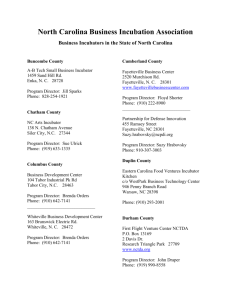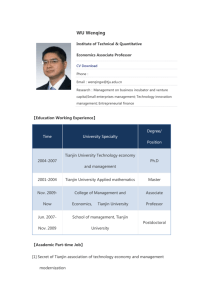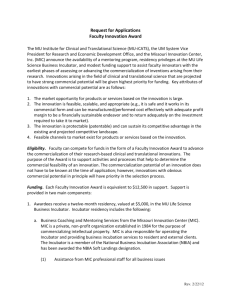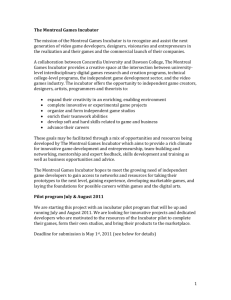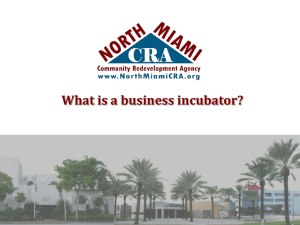Using CDBG for Job Creation - City of Shreveport, LA
advertisement
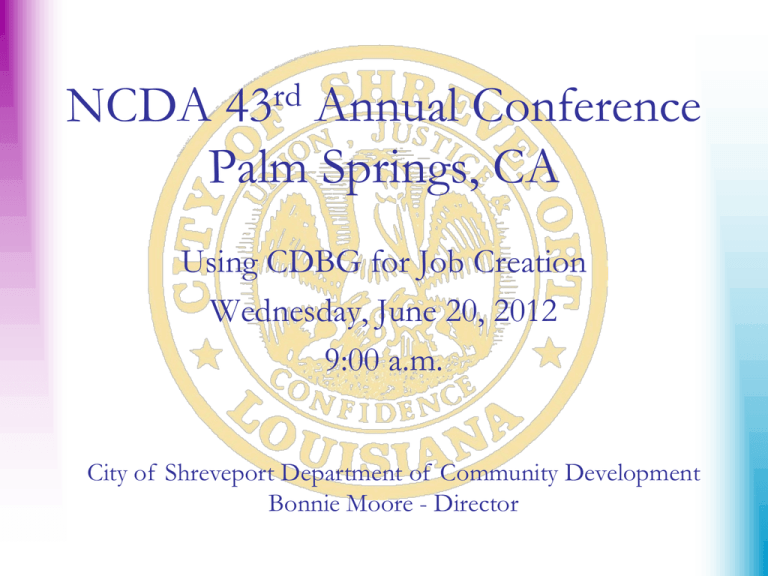
rd 43 NCDA Annual Conference Palm Springs, CA Using CDBG for Job Creation Wednesday, June 20, 2012 9:00 a.m. City of Shreveport Department of Community Development Bonnie Moore - Director Southern University Shreveport, LA Center of Business and Community Development What Are Business Incubators 1. Typically facilities where business share expertise and cost. 2. Facilities which offer access to expertise and services through: SHARED OFFICES COMMON EQUIPMENT RESEARCH MENTORING MANUFACTURING SPACE JOINT MARKETING BUSINESS SUPPORT OTHER TECHNICAL AND SUPPORTIVE SERVICES Center of Business & Community Development Why We Chose to Do a Business Incubator • In our 2004-2008 Consolidated Plan Economic Development was our #1 priority. Tremendous emphasis was placed on economic development activities. • Under Strategy 3:3: Create opportunities to provide a full range of business assistance services for new and expanding businesses and entrepreneurs. • The performance goal was to establish an incubator by December 31, 2004 Why We Chose MLK • • • • • • • • • Disinvestment in this neighborhood Poor business climate Unemployment rate 16.7 percent Median household income $21,681 Per capita income $13,336 Graduation rate 40.3 percent Struggling Businesses Few new start in the last decade Southern University Shreveport began a small business technical program with emphasis on MLK, which enabled a partnership to be formed. How it Meets CDBG Requirements • May do other types of business assistance under special ED (24 CFR 570.203) • Public Benefit test (24 CFR 570.209 (b)) – – – – – Job creation and retention Area benefit Low-to-moderate income limited clientele Elimination of Slum or Blight Micro-Business Enterprises Incubator Development • Prepare a feasibility analysis • Locate site • Do financials and marketing plan • Identify resources • Develop Evaluating Incubator Applications • • • • • Evidence of need and support Qualified management Cluster concentration within the community Ability to leverage Plan for self-sufficiency Historical Perspective SUSLA Business and Community Development Center • $2.4 Million Building funded by HUD HBCU Grant, State of Louisiana, City of Shreveport, and Southern University System • Construction was completed in June 2009 • Open for business July 2009 • Eight suites are available for business • At present facility is at capacity • Rental Cost• Leasing Term- Business Incubator Funding • • • • • • • SUSLA-HUD HBCU City of Shreveport- CDBG City of Shreveport- General Funds State of Louisiana Southern University Southern University Foundation DOA- Facility Planning Total $162,000 $650,000 $100,000 $900,000 $137,000 $300,000 $180,000 $2,429,000 Partners • • • • • • • U.S. Department of HUD City of Shreveport Community Development Louisiana Economic Development (LED) Southern University System Louisiana Business Incubator Association African American Chamber Inner City Entrepreneur Institute Incubator Clients Business Type of Business Speech Therapy Unlimited MLD and Associates Sangbahn Scere Law Office Chloe’ Duplessis Consulting ACCION Texas-Louisiana Westaff Employment Service Speech Therapy for Children Tax Service Legal Services Consultant Micro-lending Temporary Employee Agency Capital One Bank Southern University Branch • Opened August 2010 • Located in a LMI community Branch Manager Presents System Board Chair with key to the Branch Capital One Executives, State and Local Officials Capital One Bank Southern University Branch ACCION Texas-Louisiana • Established Local Office in June 2010 • Funded 25 businesses • Total Loan Amount: $477,000 Small Business Development Activities • Business Incubation Program • Entrepreneurship Training • Small Business Development, Technical Assistance, and Incubator without Walls • Intense Technical Assistance Program • Business Opportunity Grants • Small and Emerging Business Development Program • Youth Entrepreneurship Business Incubation Services • Below market office rental • Individual business counseling and coaching • Technical Assistance Training Academy for Dental Assistants (Felicia Posey-Owner) • Access to office equipment and clerical support • Certified incubation manager by NBIA Xpress Testing (Alysia Jones Owner) Intense Technical Assistance • • • • • • • Each Business Gives a One Year Commitment Companies are assigned to a management, marketing, and accounting consultant Consultants assess the businesses and provide TA and recommendations monthly Goal is to Increase Profit, Market Share and Create Jobs Spent $ 80,000 over two years providing technical assistance Worked with 12 business owners Five African American Business Owners were contracted as consultants (Chronicles of Numbers, Bledsoe, Dotson, & Associates, Cawthorne Financial Services, Tiya Scroggins Consulting, and BMK Marketing) Entrepreneurship Training • Twelve individual classes • Enrollment of 20 students per year • Presenters are experts in each subject area Entrepreneurship Training • Networking opportunities • Assistance with business plan development Graduation Business Opportunity Grants • Started in 2005 with funds from City of Shreveport • Provide up $2500 to businesses • Utilized for equipment purchases • Awarded over $117,000 to 60 business owners Youth Entrepreneurship Biz Camp visit to Incubator Biz Camp Graduation • Partners with the ICE Institute and Caddo Schools for 11 years in delivery of BizCamp • Provide $90,000 in funds plus in-kind donations • Director and Business Studies Professors assist in instruction LED Small and Emerging Business Development • Provide program for five years • Received $155,000 in funds • Awarded $125,000 in contracts to African American businesses • Provided services and training to 152 business owners Challenges • Staffing to meet the need of the number of clients needing assistance • Level of support clients need • Client commitment and follow-up • Administrative support required • Resources • Resources to engage consultants and provide intense TA, financial assistance to a larger number of clients • More space for new clients Incubator Outcomes • Initial and subsequent funding from HUD HBCU grants • Admitted twelve businesses into the program • Two businesses graduated • Created 16 new jobs (microenterprise owners not included) • Provide technical assistance to an average of 125 per year • Enhanced employment & earnings • Expanded networking • New business formations The End

